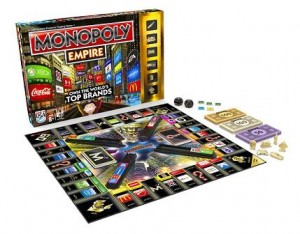Welcome to Purple Pawn, covering games played around the world by billions of people every day.
 Call this a rant if you will; I prefer to think of it as an editorial. In either case, the problem I want to talk to you about is the way some people have responded to Monopoly Empire, a recently released variation on the classic board game from Hasbro.
Call this a rant if you will; I prefer to think of it as an editorial. In either case, the problem I want to talk to you about is the way some people have responded to Monopoly Empire, a recently released variation on the classic board game from Hasbro.
For those of you not familiar with it, the primary distinguishing feature of Monopoly Empire compared to the original Monopoly is that instead of buying and selling real property, players in the new game accumulate well-known brands, such as McDonalds, Coca-Cola, Intel, Xbox, and Nestle. Other differences include a single rent rate that applies to all of a player’s brands (properties) and the game ending when a player has collected a certain number of brands (rather than when bankrupting everyone else).
At first, complaints circulated through many media outlets about Hasbro eliminating the jail space from the game. While I could spend time defending this as a design choice, the simple fact is it turned out not to be true.
More recently, I’ve read criticism of the game’s focus on corporate brands. In fact, the Campaign for a Commercial-Free Childhood has just nominated Monopoly Empire for a TOADY, that organization’s award for worst toy of the year.
For more than 60 years, Monopoly was almost the perfect board game. But one thing was missing: ads! Fortunately, the good people at Hasbro rectified that with Monopoly Empire, where “Every space on the board is an iconic brand.” Goodbye to the boring old hat and shoe. Hello to “cool brand tokens” like McDonald’s fries or an xBox controller. Instead of buying properties, players race around the board collecting brands—Boardwalk and Park Place are now Coca-Cola and Samsung—and build towers out of billboards. Is there a better way to teach kids that whoever owns the most brands, wins?
And it’s this nomination that finally set me off ranting editorializing to you, because with regard to Monopoly Empire, CCFC got it completely wrong.
First of all, original Monopoly isn’t even close to a “perfect game.” While not as bad as many hard-core gamers will suggest, among other problems, Monopoly depends a lot on luck and not much on strategic decision-making. Yet it’s the new version that CCFC nominates as a “toy oppressive and destructive to young children.”
Second, while the game’s precursor, the Landlord’s Game, was designed to teach the evils of capitalism, Monopoly itself became popular for the opposite reason. It gave people the opportunity to play at becoming wealthy and bankrupting their opponents. Is that the type of activity and lesson the CCFC is trying to protect?
Third, Monopoly is a game that has players building business empires. In the original version, those businesses were based on the real-estate industry in Atlantic City. All this new version does is update the game to industries and businesses with which modern players are more familiar.
So, chill CCFC! I get that Monopoly Empire triggers feelings of nostalgia for the original. But a game that’s “oppressive” to young children. Not even close.
1 Comment
Sorry, the comment form is closed at this time.
Trending
- Massdrop.com
- Oh the Irony—Illuminati Card Game Continues to Inspire Conspiracy Theorists
- Home
- Footprints, an Educational Ecology Game
- USPS Adds Board Game Flat Rate Box
- Baila, the Estonian Drinking Card Game
- Crystal Caste Wins Dice Patent Suit Against Hasbro
- Mirror Game, Red and Blue
- Hasbro and Mattel Merger?
- Are Board Games Dangerous?
Archives
Most Popular Articles
- Oh the Irony—Illuminati Card Game Continues to Inspire Conspiracy Theorists
- The 20 Most Valuable Vintage Board Games
- The Truth About Dominoes On Sunday in Alabama
- Sequence Game, and Variants
- USPS Adds Board Game Flat Rate Box
- Baila, the Estonian Drinking Card Game
- The 13 Most Popular Dice Games
- Are Board Games Dangerous?
- Guess Who? The Naked Version
- What Happened to the Jewel Royale Chess Set?
Recent Posts
- Toy Fair 2019—Breaking Games
- Talisman Kingdom Hearts Edition
- Toy Fair 2019—Winning Moves
- Toy Fair 2019—Games Workshop
- Toy Fair 2019—Star Wars Lightsaber Academy
- Toy Fair 2019—Stranger Things Games
- Toy Fair 2019—HABA
- Licensing Roundup
- Game Bandit
- 2018 A Difficult Year For Hasbro But Not For D&D Or MtG
Recent Comments
- on Toy Fair 2019—Winning Moves
- on Game Bandit
- on Second Look—Dungeons & Dragons Waterdeep Dragon Heist
- on Crowdfunding Highlights
- on Beyblade SlingShock
- on Game Bandit
- on Game Bandit
- on Watch This Game!, the Board Game Review Board Game
- on Second Look—Vampire: The Masquerade 5th Edition
- on Palladium Books Loses Robotech IP License, Cancels Five-Year-Overdue Robotech RPG Tactics Kickstarter





I’m not a fan of Monopoly, at least not since I was a youngster and didn’t have today’s quality games available. But, I agree with your rant (I mean, editorial comments). This is not a game I would buy or give to anyone, but it does sound like a slightly better version of the old standby.